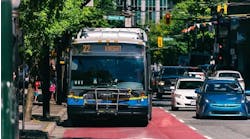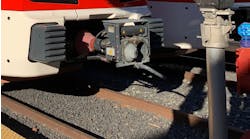Link Transit is situated in Wenatchee Washington, nestled into the east slope of the Cascade Mountains at the confluence of the Wenatchee and Columbia Rivers. Link Transit is the beneficiary of extensive local investments in clean hydro-power. Link Transit receives its power from the Chelan County Public Utility District (CCPUD) which is 100 percent hydro generated by the CCPUD’s two Columbia River dams and its Chelan River dam. This abundance of hydro-power has resulted in a highly stable power source and some of the lowest power rates in United States. It is into this environment that Link Transit decided to pursue electrification of its bus fleet.
In 2010, Link Transit was the first entity in the Northwest to put into service a heavy duty vehicle powered by advanced batteries. In its 2010 project, Link Transit purchased 5 - 22’ trolley style buses utilizing Lithium-ion, Titanium matrix batteries from EBus Inc. of Downey, California. While these first vehicles and batteries exceeded the performance that was specified (range, power and functionality), the cooling system for the batteries failed within 2 months of the buses being put into service. These failures rendered the vehicles inoperable.
In 2011, Link Transit’s vendor, Ebus Inc. repowered these vehicles with an older battery technology – Nickel Cadmium battery cells. These batteries were installed to allow Link Transit to operate the battery powered buses and to debug the vehicles and the charging technologies while the vendor reworked the battery system. This older technology, while functional and reasonably reliable, only allowed the buses to be operated for about 4 to 5 hours per day.
In 2012 EBus delivered and installed at Link Transit, the first robotic vehicle chargers in the Northwest. Not only were these the first robotic chargers in the Northwest, they were the first high-power chargers to receive an Underwriters Laboratories (UL) certification for safety anywhere in the world. These chargers were capable of autonomously finding and plugging into the vehicle’s charge receptacle and recharging the vehicle at a rate specified by the battery management system from a low of 50 kilowatts to high of 240 kilowatts per hour. The use of this cutting edge charger allowed Link Transit to extend the range of the Nickel Cadmium powered buses from 50 miles to approximately 115 miles by repeated short (6 to 8 minutes) charges per hour of service.
In 2014 EBus repowered Link Transit’s trolley style vehicles with a Lithium-ion Iron Phosphate matrix battery system. This new battery solved the leakage problem with the original Titanium Matrix battery system and provided a durable – long life battery (Nickel-Cadmium only lasts about 2 years). The combination of the Lithium-ion Iron Phosphate matrix battery with the robotic fast chargers extended the range of the vehicle from approximately 115 miles to over 160 miles.
In 2015 the Trolleys saw significant failures of the battery management circuit boards. After extensive reworking, it was determined that the robotic fast chargers were causing the circuit boards to fail after approximately 200 charges (each bus was charged about 22 times per day). This translated into each bus having a circuit board failure every two weeks. In early 2016, Link Transit made the decision to stop fast charging the batteries. This action eliminated the circuit board failures, but effectively reduced the maximum range of the vehicle to approximately 80 miles. It was also discovered that the batteries were highly temperature sensitive. When the ambient temperature was above 95 degrees F, Link Transit saw its batteries overheat. To avoid overheating, the batteries could not be charged at a full rate. As Wenatchee experiences about 6 weeks each summer at or above 95 degrees, this seriously limited performance of the buses. It was also discovered that without the fast charging of the batteries when the ambient temperature was below 35 degrees F, the batteries would not provide adequate energy to power the vehicle. The effect of these temperature impacts made the vehicle severely limited from December to March and from mid-July to mid-August.
Regardless of the performance limitations, Link Transit continued to operate these buses through 2017. In early 2018, Link Transit began experiencing a high number of battery failures on the EBus fleet. With the severely limited performance of these first generation vehicles, Link Transit made the decision to terminate the EBus program and focus their energies on their second and third generation battery electric vehicles.
In 2016, Link Transit ordered 5 BYD (Build Your Dreams) 35’ transit coaches (the second generation vehicles). These buses were manufactured in Lancaster, California based on designs and parts from China. These buses were built as plug-in charge vehicles and were equipped with advanced Lithium-ion Iron Phosphate batteries. These buses were much larger (35 seats vs 19 in the EBus) and were a fully featured and climate controlled transit bus. These buses were the first full sized battery electric buses deployed in the Northwest.
BYD delivered the first vehicles to Link Transit in early 2017. The buses were built with enhanced batteries and drive motors which delivered a 145 mile range (adequate for a plug-in bus). However, the bus demonstrated a large number of production related defects and showed significant temperature related impacts. These first generation BYD buses had significantly reduced range when the ambient temperatures were below 35 degrees F (almost a 50% reduction in range) and when temperatures were above 95 degrees F, the vehicle would not accept a charge at the full rate, reducing range by about 30%. Over the past 18 months, BYD has worked extensively to resolve their production defects and most of the production issues have been resolved. The temperature sensitivity problem is more complicated. BYD has developed a number of software modifications to minimize temperature challenges. These changes have improved the performance during temperature extremes, but significant limitations are still present.
In 2018, Link Transit acquired the first in the world, wireless (magnetic) 200 kilowatt vehicle charger and had one of our BYD coaches retrofitted with charge receiver equipment (third generation vehicle). This charger was UL certified for electrical and magnetic field safety and was Federal Communications Commission certified for magnetic interference. On March 23, 2018, Link Transit wirelessly charged the first transit bus in world at a rate of 208 kilowatts (previous applications had been limited to 50 kilowatts). The wireless charger has extended the range of the BYD coach from 145 in plug-in mode to over 250 miles and by periodically charging the bus, has mitigated some of the impacts of low and high ambient temperatures. During August when ambient temperatures have been between 55 degrees and 90 degrees F, the bus has demonstrated high reliability and functionality.
Based on Link Transit’s experience with the BYD coaches in the Wenatchee temperature extremes, BYD has agree to build Link Transit 10 new buses with a temperature managed battery system. (5 additional buses and 5 to replace the original buses). This new temperature managed battery design, combined with the wireless vehicle chargers should address the performance issues Link Transit has seen with battery electric vehicles and allow Link Transit to fully demonstrate and benefit from the promise of clean, low energy cost, zero emission buses. These new 4th generation vehicles are expected to be delivered in 2020.
What Link Transit has learned over time working with this technology has helped move the industry forward. Our staff has worked closely with the manufacturers of the vehicles and chargers to refine the technology, develop fixes to problems, and provide actual operating feedback so changes and improvements in the technology can be effective. With many transit systems jumping onto the electric vehicle bandwagon, it is important for them to know that there still remain many challenges with electric vehicles. Link has found that electric vehicles are not a direct replacement for fossil fuel vehicles, and may require maintaining a larger fleet of vehicle than otherwise would be necessary. The reliability of electric vehicles is still somewhat behind what traditional vehicles offer, so that should be of concern to systems making the move toward electrification for the first time. The knowledge and training required of vehicle maintenance staff is usually far beyond what has been available or necessary to maintain fossil fuel transit vehicles. And with the rapid progression of technology, there is a constant learning curve to keep up with changes. Additionally, routes and schedules may need to be modified or adjusted to accommodate the limitations of electric buses. Coach operators need to be specially trained to operate electric vehicles, and it takes time to develop a feel for driving these, as it does with any vehicle. All of these factors should be considered when considering whether electric vehicles are a good fit for your system.
Link Transit has been fortunate to have a Board of Directors that has been supportive of the efforts to electrify our fleet, despite the many setbacks and delays the projects have seen. And our community is supportive of the efforts as well, and many desire us to keep moving in this direction, with their ultimate goal to have a majority of our fleet using battery electric technology.


